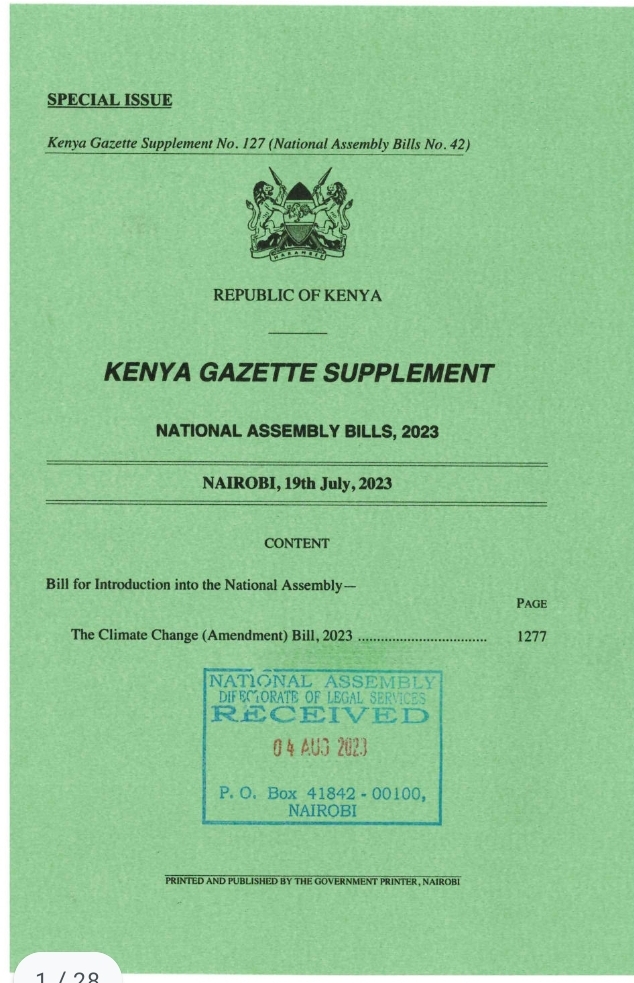
About the Bill
The Climate Change (Amendment) Bill, 2023 (National Assembly Bills No. 42 of 2023), sponsored by the Leader of Majority Party of the National Assembly, was published on 19th July, 2023 and read a first time on 8th August, 2023.
The principal object of this Bill is to amend the Climate Change Act, 2016 to provide for the regulation of the carbon markets. The Climate Change Act, 2016 is national legislation intended to enhance response to climate change and provides mechanisms and measures to achieve low carbon climate-resilient development. However, the Act does not provide a legal framework for carbon trading.
The Kyoto Protocol—an instrument that operationalizes the United Nations Framework Convention on Climate Change— was adopted on 11 December 1997 and entered into force on 16 February 2005. The detailed rules for the implementation of the Protocol were adopted at COP 7 in Marrakesh in 2001. Kenya became a party in 2005. The Protocol commits industrialized countries and economies in transition to limit and reduce greenhouse gases (GHG) emissions in accordance with agreed individual targets.
Article 17 of the Kyoto Protocol provides for the International Emission trading mechanism. The provision allows countries that have emission units to spare to sell the excess capacity to countries that are over their targets. Carbon credits are what is generated by developing parties and are bought by developed parties who have exceeded their assigned amounts.
Highlights of the Bill

Clause 2 of the Bill seeks to amend section 2 of the Act in order to provide for the definition of the new terms introduced by the proposed amendments.
Clause 3 of the Bill seeks to amend section 3 of the Act to provide for, as one of the objects of the Act, to provide guidance in the development and implementation of carbon markets and non-market approaches in compliance with international obligations.
Clause 4 of the Bill seeks to amend section 4 of the Act to delete reference to the Schedule as the aspects of public participation are provided in section 24 of the Act and the Regulations.
Clause 5 of the Bill seeks to amend section 6 of the Act to provide for an additional mandate the Climate Change Council to provide guidance and policy direction on carbon markets to the national and county governments, the public and other stakeholders.
Clause 6 of the Bill seeks to amend section 7 of the Act on membership of the Climate Change Council as follows:
- (c) the Cabinet Secretary responsible for economic planning
- (f) a representative of the private sector nominated by the body representing the largest number of institutions in the private sector
- (g) a representative of the Civil Society nominated by the most representative registered national umbrella association of civil societies working on climate change
- (ga) a representative of the youth
- (h) a representative of the marginalised community within the meaning of Article 260 of the Constitution who has knowledge and experience in matters relating to indigenous knowledge
- (i) a representative of the academia nominated by the Commission for University Education.
- (7) The Council shall at its first sitting, ballot to determine which of the members appointed under subsection (2) (f), (g), (h) and (i) shall serve for a two year term to ensure pro rata succession of membership.
- (12) Except as provided in subsection (7) the membership of the Council shall be for a term of three years and renewable once.
Clause 7 of the Bill proposes the following amendments to section 8 of the Act (Powers and duties of the Cabinet Secretary):
- The Cabinet Secretary to report annually and not biannually to Parliament on the status of implementation of international and national obligations to respond to climate change, and progress towards attainment of low carbon climate resilient development
- Provision of additional functions to the Cabinet Secretary: advise the Council on the carbon budget for trading, based on Kenya’s international obligations; approve international transfers of mitigation outcomes and emission reduction based on advice from the Climate Change Directorate; approve measurement, reporting and verification of greenhouse gas emissions; authorize the establishment of the Reduced Emissions from Deforestation and Forest Degradation Registry and other sector registries to feed into the National Carbon Registry
- The Cabinet Secretary shall appoint the Designated National Authority for market mechanisms and any other mechanisms deriving from Article 6 of the Paris Agreement
- The Designated National Authority appointed under subsection (2A) shall, in addition to international obligations, maintain the National Carbon Registry established under section 23G
Clauses 8 and 9 of the Bill seek to amend sections 9 and 10 of the Act to rename the head of the Climate Change Directorate from Director of Climate Change to Secretary of Climate Change.
Clause 10 of the Bill proposes the following amendments to section 13 of the Act (Cabinet Secretary to coordinate the preparation of climate change action plans, strategies and policies):
- The National Climate Change Action Plan shall prescribe the following additional measures and mechanisms—
—to guide on the description of annual carbon budget for each of the years that make up the five-year cycle
—to identify past, current and projected sector-based greenhouse gases emission profile
—to set out proposed carbon credit project pipeline based on the white list
—to review and recommend the level of compliance with international climate commitments
—to specifically identify, where appropriate, priority actions to explore carbon trading
—to provide for components relating to carbon markets to be considered in the Action Plan as this is the main planning and mainstreaming document
- In formulating the National Climate Change Action Plan, the Cabinet Secretary shall be informed, additionally, by national and international laws and policies relating to climate change and carbon markets.
Clauses 11, 12, 13 and 14 of the Bill seek to amend sections 15, 16, 24 and 36 of the Act to empower the Cabinet Secretary to make regulations and not the Climate Change Council.
Clause 15 of the Bill seeks to insert a new Part in the Act to provide for the regulation of carbon markets. The New Part IVA proposed in the Bill provides for the following:
- Elements to be contained in policy direction on carbon markets
- New section 23B providing for trade in carbon market which should ensure that—
—transactions in carbon trading as carried out under this Act aim towards a reduction of greenhouse gas emissions as per the prescribed carbon standards
—mitigation outcomes reported under the requirements of this Act shall be accounted for in tonnes of carbon dioxide equivalent
—carbon offset projects emissions are kept out of the atmosphere for a reasonable length of time
—emission reductions are carefully recorded and documented for every offset scheme, utilizing appropriate accounting terms, corresponding adjustments, and location of offset as required by the United Nations Framework Convention on Climate Change and other standard bodies.
- New section 23C on participation in carbon markets. It provides that the participation in an initiative authorizing trade in carbon credits shall be as a result of a bilateral or multilateral trading agreement; as a result of trading with a private entity; or in a voluntary carbon market. The section further provides that the Cabinet Secretary may−
—enter into a bilateral or multilateral agreement with another State Party to trade carbon for emission reductions and removals
—with the approval of the Cabinet, enter into an agreement with a private entity to offset carbon emissions
—with the approval of the Cabinet, enter into any agreement to trade in a carbon market established or overseen by an internationally recognized entity that is approved by a recognized credible international body.
The section also provides that an agreement entered into under the Part shall aim to promote the mitigation of greenhouse gas emissions while fostering sustainable development; and incentivize and facilitate participation in the mitigation of greenhouse gas emissions by authorized public and private entities.
Further, it provides that the Cabinet Secretary shall, in the national reporting mechanism to the United Nations Framework Convention on Climate Change, include any emission reduction resulting from agreements entered into under the section.
- New section 23D provides that every carbon trading project authorized under the Act shall be required to undergo an environmental and social impact assessment in accordance with the Environmental Management and Coordination Act, 1999
- New section 23E provides that a project undertaken pursuant to the Act shall specify the anticipated environmental, economic or social benefits of the project.
- New section 23F provides that the national and county governments shall, in compliance with international obligation, undertake best practices regarding the share of proceeds and cancellation rates for overall global mitigation.
- New section 23G provides for the establishment of the National Carbon Registry which shall include registers on the following—
— the carbon credit projects and programmes implemented to reduce greenhouse gas emissions in Kenya
— the Reduced Emissions from Deforestation and Forest Degradation Carbon
—authorisations granted for participation in any initiative, project or programme under the Act
—the carbon budget and the greenhouse gas reduction units
—the amount of carbon credits issued or transferred by Kenya
—the amount of carbon credits issued to emission reduction projects and programs recognized by Kenya from a national greenhouse gas registry account
—the transfer of carbon credits and any carbon credits issued or recognized by Kenya from a national greenhouse gas registry account
—a record of corresponding adjustments where applicable, with respect to carbon credits
—the cancellation of carbon credits and any other carbon credits issued or recognized by Kenya from a national greenhouse gases registry account
—any other carbon credits issued or recognized by the Kenya from a national greenhouse gases registry account
- New section 23H providing for dispute resolution. It provides that any dispute arising under a land-based project shall be subjected to the dispute resolution mechanism set out in the Community Development Agreement in the first instance and be resolved within thirty days from the date the dispute is lodged. Further, any dispute that is not land based and is not subjected to a community development agreement shall be resolved through Alternative Dispute Resolution in the first instance. Where the dispute is not resolved within thirty days of submission, the dispute shall be referred to the National Environmental Tribunal.
Clause 16 of the Bill seeks to delete the Schedule to the Act as section 24 already provides for making of regulations on public participation.
How do you submit your views?
The Bill has been committed to the Departmental Committee on Environment and Natural Resources which is considering it and will table its report. Pursuant to standing order 127(3) of the National Assembly Standing Orders, the Committee shall facilitate public participation and shall take into account the views and recommendations of the public when the committee considers the Bill.
In addition, pursuant to standing order 127(4) of the National Assembly Standing Orders, the Committee is required to submit its report to the House within thirty calendar days of the committal of the Bill to the Committee.
Members of the public may submit any comments on the Bill to the Office of the Clerk of the National Assembly, 1st Floor, Main Parliament Buildings, Nairobi, Kenya, through P.O. Box 41842-00100, Nairobi, Kenya or email cna@parliament.go.ke.
Since the Bill concerns county governments, once it is passed by the National Assembly, it will be
submitted to the Senate for its consideration.
Listen to this post:
_
ayes & nays
